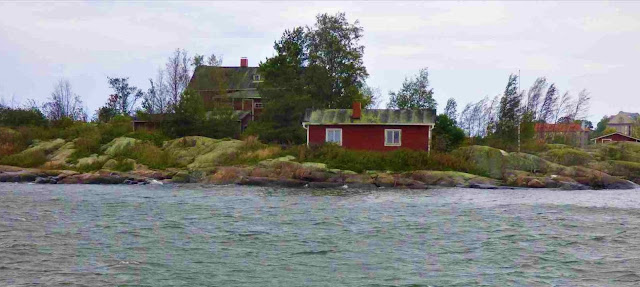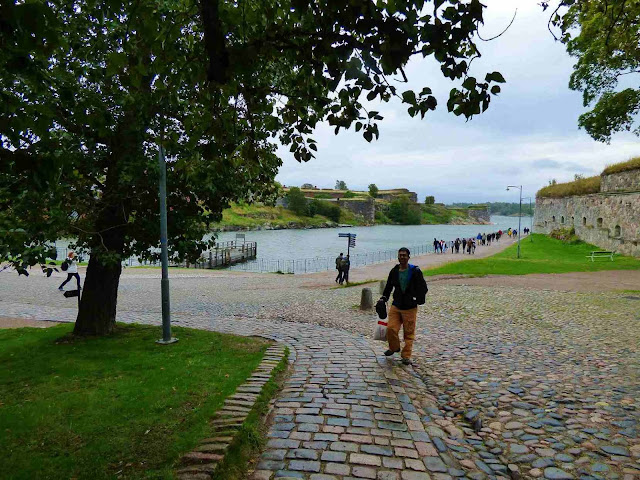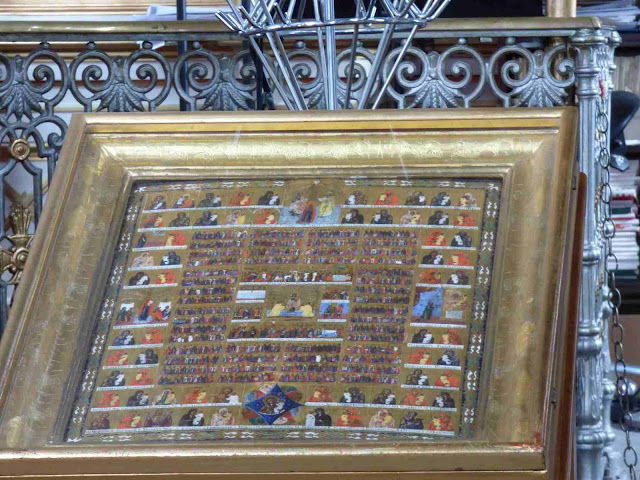DAY 14 Thursday Sep 12, 2019:
Our agenda for the day was to visit the sea fortress Suomenlinna/ Sveaborg, the castle on an island near Helsinki.
Suomenlinna is the Finnish name, means Finnish castle. It's Sveaborg
in Swedish, meaning Swedish castle.
It's accessible only by water. A ferry service runs from the Helsinki Market Square to Suomenlinna throughout the year. In the summer season, a water bus service to Suomenlinna is also available. The guest harbor in the middle of Suomenlinna caters to visitors arriving by their own boats.
It's accessible only by water. A ferry service runs from the Helsinki Market Square to Suomenlinna throughout the year. In the summer season, a water bus service to Suomenlinna is also available. The guest harbor in the middle of Suomenlinna caters to visitors arriving by their own boats.
The ferry is part of the city transport network and all HSL tickets are accepted. We had the day pass bought the previous night at the airport when we returned after returning our rental car. So we were good for the day.
As usual we started off after some home made food.
We took the train to Helsinki center and made our way to the pier. The ferry departs from the east side of the Market Square, opposite the Presidential Palace.
The ferry was waiting and we boarded.
As usual we started off after some home made food.
We took the train to Helsinki center and made our way to the pier. The ferry departs from the east side of the Market Square, opposite the Presidential Palace.
The ferry was waiting and we boarded.
The trip to Suomenlinna takes 15–20
minutes and offers magnificent views of Helsinki and the surroundings
from the sea.
Ferries run 1 to 4 times per hour
from the morning until the night throughout the year.
Detailed ferry schedules are available
online. For our time period, we noted the timings 7.00, 7.40; 8.20,
8.50, 9.20, 9.40; after 10 3ferries (4 on weekends)
In Suomenlinna, the ferry arrives at
and departs from the main pier of Iso Mustasaari island, on the north
shore of Suomenlinna.
Arrived at the island, the 1st
stop.
SUOMENLINNA/SVEABORG:
The fortress of Sveaborg (Swedish Castle) dominates the island. It was built in the mid 18th century to bar Russian access to the Baltic.
During the Swedish-Russian war of
1808-09, it fell to the Russians, who thereafter enlarged and
strengthened it.
In 1918, it passed into Finnish hands
and was given the Finnish name of Suomenlinna (Finnish Castle).
During the 1950s and 1960s, it was
handed over by the military to the civilian authorities, and since
then has been restored and converted for cultural and recreational
use.
It is now included in UNESCO's list of world heritage monuments and is a museum, a park, and an arts venue. The area is open most of the year but hours and ferry access vary, so be sure to visit the website for the latest information.
We had a map printed from the official
site, so we wandered around following the route on the map.
We paid 8 euros pp for the museum... signboards in 3 languages and lots of authentic stuff. But the musty air caused a headache for me
We finished the museum visit pretty quick ... I'm ashamed to admit I was becoming cranky with the musty smell.
We walked on... weather was a little drizzly.
It was terribly windy, almost pushing
us off the cliff sometimes.
Reached the King's Gate,
Note the turf roof...
we retraced and went back to the pier.
Boarded the ferry and returned to Helsinki center.
Note the turf roof...
we retraced and went back to the pier.
Boarded the ferry and returned to Helsinki center.
We had a walking map, so strolled
around. First target was the Russian orthodox church.
Uspensky Russian Orthodox Cathedral :
One of two imposing churches that
dominate the skyline above Helsinki's harbor, Uspensky Russian
Orthodox Cathedral is an eye-catcher, a brick building whose multiple
towers and spires are topped by 13 gold cupolas.
The other church Helsinki Cathedral seen in the skyline here...
The interior is equally impressive, filled with altars, icons, and crosses, the intricate patterns on its arches set against block marble and a preponderance of gold embellishments. For us though it was a little less than expected as w had seen gorgeous churches in Moscow and St Petersburg
This is the Government Palace Helsinki. We were a little late for the internal tour, it closed at 3 PM. We just posed with the guards.
Helsinki Cathedral / Tuomiokirkko:
We walked on to the Helsinki Cathedral, also known as
Tuomiokirkko.
Built from 1830 to 1852, it replaced a
smaller 18th-century church and was originally called St. Nicholas'
Church in homage to Russian Czar. After Finland gained independence
from Russia, the church was renamed, and in 1959 it became an
Evangelical Lutheran cathedral.
The Basics Designed by German
architect Carl Ludwig Engel, who also laid out the city’s Senate
Square, the cathedral features a neoclassical-style façade. The
design was later altered by Ernst Lohrmann, who added zinc rooftop
statues of the Twelve Apostles and a few more small domes. Inside,
there is room for 1,300 worshipers. The church is used regularly for
services and weddings. The cathedral is a popular spot on most
walking tours of Helsinki.
This is the Senate Square with the statue of Alexander II
Helsinki's strikingly original Art
Nouveau railway station seen below was designed by Eliel Saarinen and is
especially notable for American tourists because its 48-meter-high
clock tower was the first of several designs that finally resulted in
Saarinen's 1922 Chicago Tribune Tower - America's first skyscraper.
We walked on to the Chapel of Silence.
Kamppi Chapel of Silence:
Just a few steps from the train station this wooden structure, with beautiful simplicity but sophisticated construction is breathtaking.
The double-hull structure keeps the outside noise to a minimum. The skylights allow in enough light to create a serene atmosphere. No pics allowed inside.
We returned back to our apartment.
Report of day 15 our day trip to LOVELY Tallinn Estonia is here:








































































































































This comment has been removed by a blog administrator.
ReplyDeletespam removed
ReplyDelete